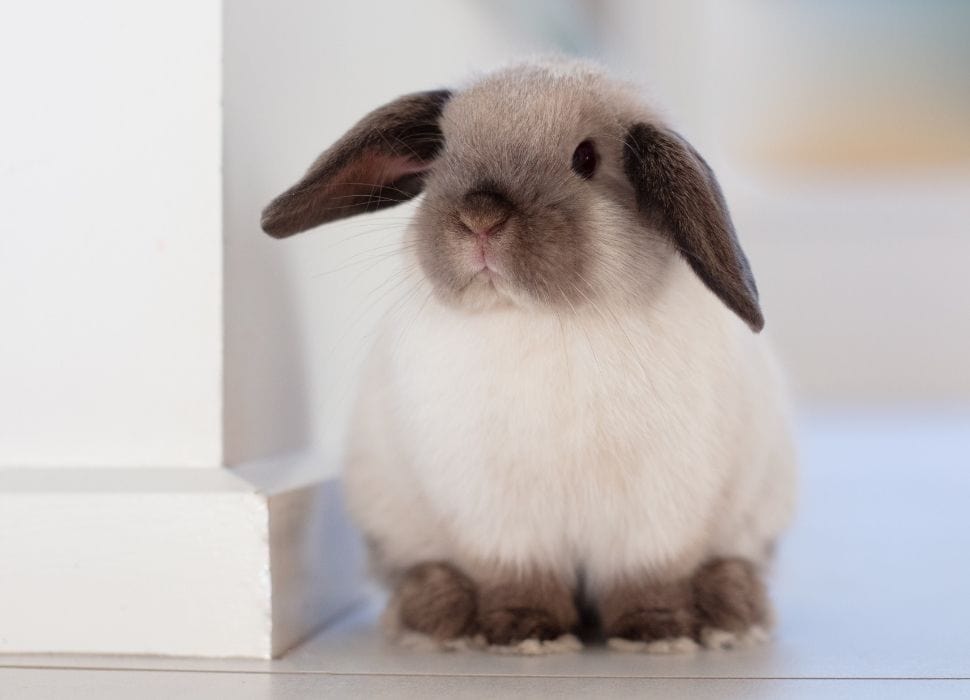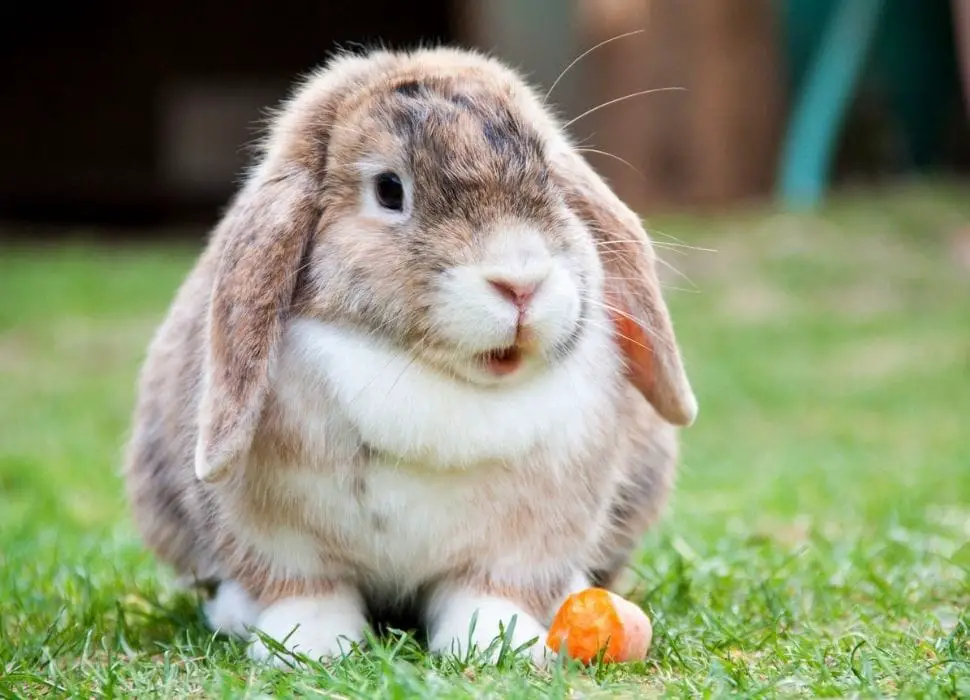If you have been observant of your bunny, you will have noticed that these cute little creatures are extremely difficult to read. They are shy, and overall very nervous, particularly around us humans.
Unlike dogs or cats who easily communicate with us through barking or meowing, rabbits are primarily silent, that is, except for one distinct sound, namely, the bunny honk! So why do rabbits honk?
Male rabbits usually honk when they reach sexual maturity and are interested in mating. This is often accompanied by circling the female. Both male & female rabbits may also honk when they are excited, for example at the prospect of receiving a favorite treat.
Male Rabbit Honking
So we know that rabbits are able to create audible noises that we humans can hear and for some of us more curious bunny owners, understanding and learning what these noises mean is interesting, especially if we are looking to bond more effectively with these mysterious little animals.

When I first started my own rabbit journey, my first male bunny ‘Popcorn’ would run around in circles at my feet while honking. Once neutered Poporns honking stopped.
I never made the connection between honking and sexual maturity immediately and it wasn’t until years later when another male bunny I owned, ‘Snowball’, also displayed the behavior (usually after I’d handled one of my many does) that this really clicked.
Amusingly, Snowball would even honk and hump at his stuffed toy bunny or even my arm when he was feeling particularly amorous. Clearly, on both occasions, honking was a result of bunny sexual frustration!
In short, honking in male rabbits is due to testosterone. Think of it as similar to the way teenage boys in a group might show off if a female is around.
Although honking is a very cute and endearing rabbit behavior, curbing sexual frustration in a male is somewhat necessary.
Not only is the situation not very nice for the rabbit but honking will likely be accompanied by destructive behavior.
This can mean your property (carpets, chairs anything that takes a bunny’s fancy) gets damaged.
Once neutered and a period of 6-12 weeks has been observed a female can be introduced for company. Remember rabbits are much happier in male and female pairings.
For rabbits, reproduction is about the survival of the species. As prey animals, rabbits know that the more rabbits there are the more likely they will survive, despite the fact that they are prey for a lot of predators, it’s this fact that has made rabbits one of the most successful animals on Earth.
Female Rabbit Honking
A female rabbit’s honking isn’t normally linked to any sexual frustration and is often a result of outside stimuli such as head strokes, petting, treats, or anything else you might be doing or offering that makes her happy.
Purring (a gentle teeth chatter) may also accompany shallow honks which also shows how much she is appreciating the attention.
Females might also honk when they are excited however this is not driven by sexual urges but more likely to be at the offer of a tasty herb salad (or access to a garden for a few hours of playtime).
Honking or Grunting?
So are there any other rabbit noises you should be aware of? well yes, and not to be confused with honking is the bunny grunt!
Rabbit grunting is often a sign that you have angered or annoyed your bunny in some way, a grunt is clearly an act of aggression and will have a distinctly different sound to the honk.
A grunt is more of a short, sharp bunny way of telling you to ‘get lost!’ and is usually accompanied by a bunny looking at you rather disapprovingly.
Male and female rabbits will both grunt and although anger and defensiveness are the most common causes, there are also others that may not be quite so obvious. We’ve described a few below:
Out of My Space!
When rabbit grunts it is usually making it abundantly clear to you that you are intruding in space that belongs to them and it doesn’t approve!
Rabbits are possessive creatures and will not take lightly any invasion of what they deem to be theirs, be it the cage, food, water bowls, or sometimes even their bunny companions.
This is why you are often likely to hear your rabbit grunt when you put your hand in the hutch, remove their companion (roommate) from the cage, or attempt to take the feed bowl for refilling.
If you persist in doing what your bunny is disapproving of, the grunts may even be accompanied by scratching and biting.
Annoyance
If your bunny grunts while stomping, then something is making it annoyed. Look for environmental factors that may be causing stress or annoyance and remove anything you think could be provoking the aggressive reaction.
Love
If the rabbit is standing on your feet and starts making some low little rumbly grunts, then that could be a sign of happiness and love.
However, if it grunts while lunging forward and the front feet are coming at you this would indicate the opposite and you’ll need to work on your relationship!
Hunger
If you have a house bunny and you came home after a long day at work and chose to start with household chores rather than immediately giving your bunny a snack, your bunny may disapprove by grunting.
It wants some answers! How dare you leave it alone for so long! Minimize the risk of a hungry (& potentially destructive) house bunny by ensuring that plenty of hay is available for him to graze on while you are out at work.
How Can I Make a Rabbit Stop Grunting?
So we know that one of the main causes of grunting is defensiveness and anger particularly when the rabbit feels like its space is being encroached but how can you stop this behavior, particularly if it is born out of agitation or stress?
Firstly, you will need to find out exactly what is agitating him if you are to succeed in stopping the unprovoked grunts. For a start, ensure the following:
Hutches and Living Spaces are Predator-Proof
Your bunny will always get uneasy around predators. Even the presence of the family cat or dog can be alarming as it will instinctively know how dangerous those two animals can be.
Any animal or bird of prey might alarm your bunny into grunting (and accompanied stomping) so try to ease some of that anxiety by ensuring that predators don’t get anywhere near the hutch.
Rabbits also have a highly sensitive sense of smell and even if they can’t see the predator that is frightening them the aroma may alarm them.
Check around for droppings, urine, and any other scent that to the rabbit might indicate the presence of predators.
Noise in the Rabbit’s Area is Kept Low
Rabbits are fragile and easy to frighten because of their prey nature. Any strange noises; be it from your kids, TV, loud music, or rapid movement may scare it into grunting.
You should always ensure that any noises that would potentially make your animal feel unsafe are prevented.
Keep the Rabbit Healthy
Regular visits to the veterinary surgery will ensure that your rabbit is healthy most if not all of the time.
Sometimes a rabbit may grunt through uncomfortable medical issues such as bladder infection or pain due to overgrown teeth. Regular vet checkups will ensure the rabbits never suffer these irritations.
Boredom
Your animal could be grunting all the time out of boredom, loneliness, or intellectual stagnation. If you can afford to home another bunny, consider a companion to your bored bunny.
Another way of handling this is to acquire plenty of toys or ‘boredom busters’ at your local pet store and place them into the hutch.
Rabbits are stimulated intellectually when they chew on things so this will help kill the boredom and indulge their chewing instincts.
How Do I Calm Down A Grunting Bunny?
If someone has provoked your bunny into grunting. It is possible to calm him down. If you can assure the animal that whatever alerted him in the first place wasn’t a danger at all.
Here are some other rabbit-calming tactics that you can try:
Offer a Treat
Rabbits have a sweet tooth and do pretty much anything for treats. If it was disgruntled by the presence of a cat, give reassurance and a piece of carrot, apple, or banana should be enough to calm the nerves. This kind act will also show the rabbit that it can rely on you for protection even in times of danger.

Pet Your Rabbit Regularly.
Stroking your bunny’s forehead gently and regularly may help with any defensive attitude. If the rabbit is angry and lunging forward in an attempt to bite your hand you will need to be very vigilant, rabbit bites hurt!
Wear gloves whenever socializing with an angry bunny and never attempt to pick one up by placing your hand above the head/face. You are likely to put the rabbit in all-out attack mode if you do!
Petting your bunny also means spending quality time with it.
Don’t only appear at the cage when you want to pick it up or disrupt its peace. Try sitting outside or next to it and reading a book without touching the bunny or cage.
Spend an hour talking to the rabbit and then walking away without touching it.
This will show the bunny that your presence isn’t always a nuisance; that you two can coexist peacefully without getting under each other’s skin. With time, it will stop acting up whenever you open the cage.
Back Off When Commanded To
If your bunny is grunting it may simply be a call for you to withdraw and leave it alone for a while. If you obey this command, the rabbit will gradually start to feel like it is in charge and you are not as scary as initially thought.
Acquire an Artificial Tunnel
In the wild, frightened rabbits hide in tunnels because they don’t have the physical strength to fight off predators. Indulge their wild instincts by placing an artificial tunnel in the cage or play area. Whenever frightened, the rabbit might choose to hide in the tunnel instead of grunting.
Further Reading
Rabbit Noises and Their Meanings oxbowanimalhealth.com
Understanding Rabbit Noises homeandroost.co.uk
Rabbit Sounds – Understanding What They Mean northernnester.com
Frequently Asked Questions
Are rabbits happy when they honk?
Yes, honking is often a sign of excitement or happiness in rabbits, especially when they’re running around or playing.
Is rabbit honking bad?
Honking in rabbits isn’t generally bad. It’s often a happy sound, but if accompanied by signs of distress, it could indicate a health problem.
What does a rabbit with a respiratory infection sound like?
A rabbit with a respiratory infection might make wheezing, rasping, or snuffling sounds. They may also have nasal discharge and reduced appetite.
Why is my rabbit making coughing noises?
If your rabbit is making coughing noises, it may be choking, having dental problems, or respiratory issues. If it persists, consult a vet immediately.
Why is my rabbit making weird grunting noises?
Weird grunting noises in rabbits can indicate annoyance, anger, or discomfort. If these sounds are frequent or accompanied by other signs of distress, consult a vet.
